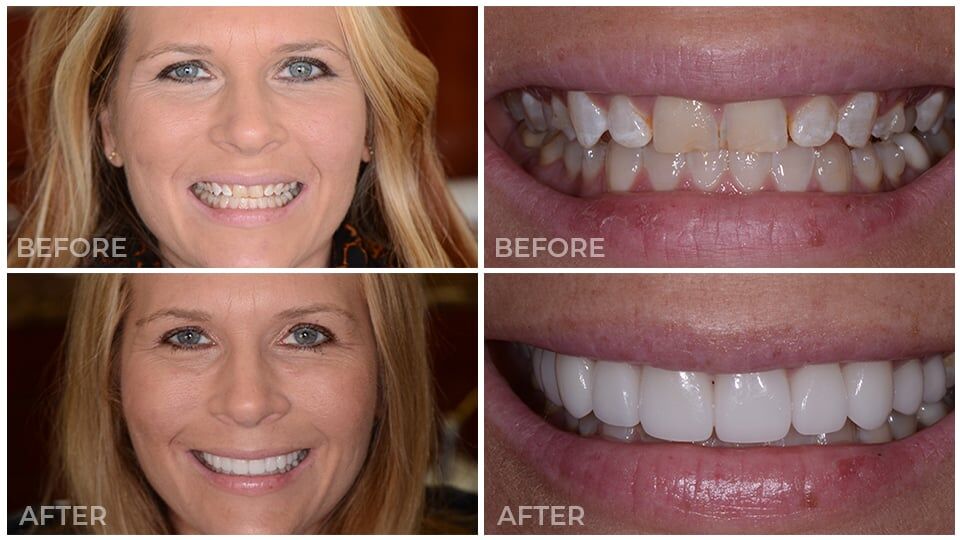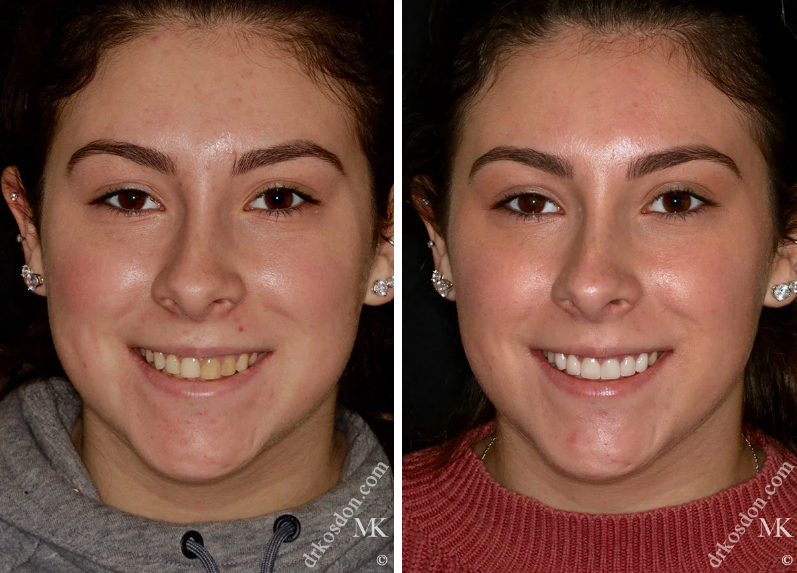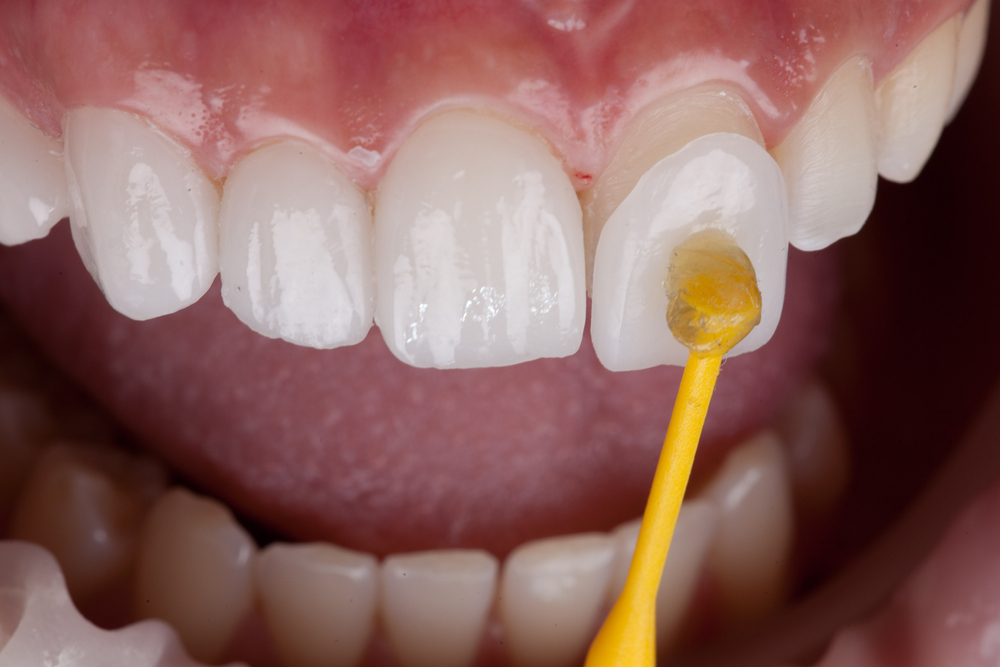Opening the Secrets of Veneers: Truths, Types, and Advantages for a Beautiful Smile
Veneers offer a compelling option for those seeking to boost their smiles. These dental improvements can address different blemishes, from discoloration to misalignment. With options like porcelain and composite, people can choose based upon their preferences and needs. Recognizing the nuances of veneers, consisting of application and care, is important. What elements should one consider prior to choosing? The answers might shock those interested in this aesthetic dental alternative.

Understanding Veneers: What Are They?
Veneers are slim, custom-made shells designed to cover the front surface of teeth, improving their look. Typically crafted from resilient materials, these shells are customized to fit each person's teeth exactly. They serve numerous purposes, including correcting visual imperfections such as discoloration, chips, or spaces. The application process includes a dental professional preparing the teeth, usually by removing a percentage of enamel to guarantee a snug fit. As soon as prepared, the veneers are bound to the teeth making use of a strong adhesive.
Clients typically pick veneers for their ability to create a natural-looking smile while offering a long-lasting solution to dental blemishes. Unlike various other cosmetic dental care choices, veneers call for very little intrusive procedures, making them a preferred option. The outcome is a better smile that can substantially boost a person's confidence and self-esteem. In general, veneers offer an efficient technique to achieving a more harmonious and appealing oral appearance.
Kinds of Veneers: Porcelain vs. Compound
When thinking about cosmetic dental choices, 2 primary kinds of veneers stick out: porcelain and composite. Porcelain veneers are crafted from a sturdy ceramic product that mimics the all-natural appearance of teeth. They are recognized for their stain resistance and capacity to reflect light similarly to all-natural enamel, providing an aesthetic appeal that many clients desire. The application process generally entails more prep work of the tooth structure and may call for several check outs to the dental practitioner.
On the other hand, composite veneers are made from a tooth-colored resin that is straight put on the teeth. This type enables quicker application and can typically be finished in a single go to. While they are less costly than porcelain veneers, they might not supply the same long life or resistance to discoloration. Inevitably, the choice between porcelain and composite veneers depends on individual preferences, budget, and particular dental demands.
The Benefits of Finding Veneers
Selecting veneers provides countless benefits that can considerably improve both the aesthetic appeals and performance of a person's smile. Among the key advantages is their capacity to deal with flaws such as staining, spaces, and misalignment, resulting in a more uniform appearance. Veneers can likewise boost the resilience of teeth, providing a safety layer that guards them from damage.
They need marginal tooth prep work contrasted to other oral procedures, maintaining more of the natural tooth framework. This preservation contributes to a much healthier oral setting while still accomplishing a sensational smile.
Veneers are extremely adjustable, permitting individuals to pick the form, dimension, and color that finest matches their preferences. Furthermore, they are stain-resistant, making it much easier to preserve a bright and eye-catching smile gradually. On the whole, veneers offer a reliable alternative for those seeking both cosmetic enhancement and long-lasting oral health and wellness benefits.
The Veneer Application Refine
The veneer application process involves several crucial steps to ensure optimal outcomes. A consultation is conducted to assess the person's requirements, adhered to by the prep work and shaping of the teeth. The veneers are bound in place, with changes made for an excellent fit and appearance.
Initial Examination Steps
A complete initial consultation is important for anyone considering veneers, as it establishes the foundation for a successful therapy. Throughout this meeting, the dental specialist examines the person's oral health, reviewing any kind of existing concerns that might impact the veneer application. This assessment might consist of X-rays and a visual evaluation to identify the problem of the gum tissues and teeth.
The dental practitioner additionally engages the person in a detailed conversation about their visual objectives, choices, and expectations. They might present numerous veneer alternatives tailored to the individual's specific requirements. In addition, the professional clarifies the procedure, possible risks, and aftercare needs, guaranteeing that the person is comfy and educated prior to waging the treatment.
Prep Work and Shaping Teeth
After the initial assessment, the following phase includes the prep work and shaping of the teeth to fit the veneers. This important step is done by the dental expert, who meticulously examines the tooth structure to determine the amount of enamel that needs to be eliminated. Usually, a thin layer, typically around 0.5 millimeters, is slashed off to ensure an appropriate fit for the veneers. Precision is vital during this procedure, as it influences both the general comfort and the aesthetic result. Once the teeth are appropriately shaped, impacts are taken to create personalized veneers that line up perfectly with the person's oral profile. This meticulous prep work sets the stage for a successful veneer application, enhancing both look and feature.
Bonding and Final Adjustments
Following the shaping and prep work of the teeth, the bonding procedure starts, marking a crucial phase in the veneer application. During this stage, an oral adhesive is put on the ready tooth surface area, guaranteeing a solid bond in between the veneer and the tooth. The dental practitioner meticulously places the veneer, making adjustments to accomplish the wanted placement and aesthetics. As soon as properly positioned, an unique light is used to heal the adhesive, strengthening the bond. After healing, the dental expert conducts last changes, cutting any excess product and improving the veneer's shape to ensure a natural appearance. This mindful focus to detail improves both function and looks, adding to a general gorgeous smile that is lasting and sturdy.
Caring for Your Veneers: Maintenance Tips
Caring for veneers is vital to maintain their appearance and durability. A constant daily cleaning regimen, mindful avoidance of staining foods, and normal dental check-ups are essential components of effective upkeep. These practices assist guarantee that veneers continue to be in peak condition and continue to boost one's smile.
Daily Cleansing Regimen
Routinely maintaining veneers is vital for their longevity and appearance. A correct day-to-day cleaning regimen can aid protect their shine and protect against damage. Dentists recommend brushing twice a day with a soft-bristled tooth brush and fluoride tooth paste, guaranteeing that all surfaces are cleaned carefully to avoid scratching the veneer surface area. Flossing everyday is additionally crucial to remove food particles and plaque from in between teeth, where brushes might not get to. In addition, using an antimicrobial mouth wash can help maintain oral hygiene without damaging the veneers. It is a good idea to avoid rough cleansers and tools that can damage the veneer. By complying with these simple steps, individuals can maintain their veneers looking beautiful while advertising general dental health.
Avoiding Staining Foods
Although veneers are developed to improve the appearance of teeth, their sensitivity to staining demands careful dietary selections. It is necessary for individuals with veneers to be conscious of particular foods and beverages that can result in staining. Dark-colored products such as coffee, merlot, and berry juices need to be consumed in moderation, as they are known to stain both all-natural teeth and veneers. Additionally, acidic foods like citrus fruits can weaken the bonding representatives utilized in veneers, making them a lot more vulnerable to discoloration. To preserve an intense smile, it is recommended to rinse the mouth with water after eating staining foods and to exercise routine oral health. These thoughtful selections add significantly to the long life and aesthetics of veneers.

Routine Oral Examinations

Maintaining the stability of veneers needs a dedication to normal oral examinations, as these consultations play an essential role in guaranteeing their durability and look. Throughout these visits, dental professionals can assess the problem of the veneers, inspecting for any kind of signs of wear, damages, or underlying dental concerns. Furthermore, regular cleanings assist eliminate plaque and tartar that can gather around the veneers, advertising overall dental wellness. Dentists can likewise supply tailored recommendations on care methods and items fit for veneer upkeep. By adhering to a schedule of exams, individuals can attend to potential troubles early, ensuring their smile continues to be lively and beautiful. Inevitably, regular oral visits are a critical component of veneer treatment.
Is Veneers the Right Alternative for You?
Making a decision whether veneers are the right choice usually depends upon individual oral needs and aesthetic objectives. For those looking for to attend to problems such as discoloration, chips, or misalignment, veneers can supply a transformative service. Prospects commonly consist of people with healthy and balanced teeth but desire a boosted smile.
However, it is crucial to consider aspects such as tooth enamel problem, the level of oral problems, and the determination Visit Website to maintain veneers - What Are Veneers. Consulting with an oral specialist is important, as they can review dental health and wellness and determine check if veneers appropriate
Furthermore, prospective candidates need to show on the lasting commitment, as veneers may call for replacement every 10-15 years. Cost considerations also play a considerable function, as veneers can be a significant investment. Ultimately, the decision needs to be knowledgeable, stabilizing aesthetic needs with sensible considerations for long-term results.
Regularly Asked Questions
The Length Of Time Do Veneers Generally Last Prior To Requiring Substitute?
Veneers generally last in between 10 to 15 years prior to requiring replacement. Aspects such as oral health, way of life options, and worldly high quality can affect their durability, making routine dental check-ups necessary for keeping their condition.
Are Veneers Safe for Individuals With Delicate Teeth?
Veneers can be secure for people with sensitive teeth, however it usually depends upon the seriousness of level of sensitivity and the dental professional's method. Consulting a dental specialist prior to proceeding is crucial to assure suitable results.
Can Veneers Be Eliminated or Replaced Conveniently?

Do Veneers Discoloration With Time, and Just How Can I Avoid It?
Veneers can stain gradually, especially from foods and drinks like coffee or merlot. To avoid staining, maintaining good oral hygiene, using a straw for beverages, and regular dental cleansings are recommended techniques.
What Is the Expense Range for Getting Veneers?
The expense of veneers generally varies from $500 to $2,500 per tooth, depending upon factors such as product type, dental professional experience, and area. Patients should seek advice from oral experts for individualized quotes and funding choices.
When the teeth are properly shaped, perceptions are taken to develop custom veneers that align perfectly with the patient's oral account. Throughout this phase, an oral adhesive is used to the ready tooth surface area, ensuring a solid bond between the veneer and the tooth. It is important to take into account aspects such as tooth enamel condition, the level of oral problems, and the readiness to keep veneers. Veneers can be risk-free for individuals with sensitive teeth, but it typically depends on the extent of level of sensitivity and the dental practitioner's method. The expense of see this here veneers usually varies from $500 to $2,500 per tooth, depending on factors such as material kind, dental expert experience, and place.